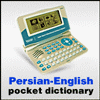 On the Aryan trail On the Aryan trail
Honest discussion of Iranian
identity is essential to building a prosperous future for Iran
Mohammad
R. Jahan-Parvar
April 27, 2005
iranian.com
A dialog on identity of Iranians as a nation is
both healthy and desirable. Respected Iranian scholar Dariush Ashuri
considers
these discussions as signs of transformation of Iran from an Asian
despotism to a modern nation-state. Admittedly, this process is
taking a very long time, given that Iranians clearly have access
to other nations' experiences. As usual, in such debates nothing
is sacred. We are supposed to critically question many comfortable
"facts". But critical thinking requires intelligent and methodical
processing of knowledge.
This is where I find faults in Mr. Madadi's analysis of origins
of Iranians ["Are
Iranians really Aryans?"]. His view of Reza
Shah Pahlavi's nation-building project is historically accurate.
Reza Shah and many of his intellectual
supporters, including at a certain point in time Taghizadeh, Hedayat,
Kasravi, and Pir Nia, indeed tried to build a national identity
for the modern Iran based on a glorified view of ancient empires
of pre-Islamic Iran. In many ways, that project required a tool
to break from entrenched and staunchly anti-modernist traditions
and customs of (mainly Shi'ite) Muslim "ummat".
Bluntly speaking,
no one could build a modern state in the wreck that was Iran
in late Qajar period, unless power of guardians of the old system;
landlords, ulama, and tribal chiefs, was crushed. Ancient Persian
Empire provided this tool.
Besides an educational system to
train bureaucrats, a dynamic legal system, an army and a police
force,
a modern nation also needs a founding myth! This myth is
generally set in the distant past. There are exceptions, US being
one of
them. But you need a myth to rally the nation. Whether Reza
shah was
right or wrong in his choice of the founding myth is an
open debate.
But Aryan origin of (majority) of Iranians is not part
of that founding myth.
There is a huge deal of controversy extant in Western world over
the word "Aryan". The dominant political terminology of early and
mid 20th century indeed attached a largely erroneous racial description
to this name. If by Aryan one means "of European or Nordic" origin,
the answer to Mr. Madadi's question is a clear "no". Iranians are
not European. The absolute majority of Iranians belong to the Mediterranean
subgroup of Caucasian race along with Arabs, Armenians, Turks,
North Africans, Albanians and Greeks.
But it is a historical fact that eastern Indo-European people
(a linguistic term and not a racial term) indeed called themselves
Aryan. That includes ancestors of many present day Afghans, Armenians,
Azarbaijanis, Iranian, Tajik, northern Indians, and Pakistanis.
 Moreover, in today's terminology, Aryan is a person who speaks
an Aryan language, a large family of Indo-European languages
spoken in western and southern Asia. In Iran this definition
includes
Persian, Kurdish, Luri, Gilaki, Mazandarani, Baluchi and many
other languages and dialects. Thus, calling a majority of Iranians
Aryan
does not seem as problematic as the author would have us believe. Moreover, in today's terminology, Aryan is a person who speaks
an Aryan language, a large family of Indo-European languages
spoken in western and southern Asia. In Iran this definition
includes
Persian, Kurdish, Luri, Gilaki, Mazandarani, Baluchi and many
other languages and dialects. Thus, calling a majority of Iranians
Aryan
does not seem as problematic as the author would have us believe.
He also makes an assertion about based on official statistics,
on percentage of Persian speaking population, and by extension,
percentage of Iranians with Aryan heritage. As a trained statistician,
I would like to see the source of Mr. Madadi's claim, since numerous
field studies show the exact opposite.
Many internationally recognized
sources including CIA and National Geographic report a slim absolute
majority for Persian speakers (51 to 52%) and a size able majority
for all Indo-European speakers (70 to 73%). Azrabaijani Turkish
is the most widely spoken non-Aryan language in Iran (about 20
to 22% of the population).
Yet, there are not many marked cultural
and anthropological differences between Azarbaijanis and other
Iranians. In other words, first majority of Iranians are indeed
speakers of eastern Indo-European languages (hence Aryan if
you will). And second, the number of Iranian citizens who do not
share racial or linguistic background with the majority is negligible.
I agree with the author that an honest discussion of Iranian
identity is essential to building a prosperous future for Iran.
But in doing so, careful choice of statements and checking the
facts are essential. Unfortunately, the author has failed in this
respect. I do agree with the author that nationalism (as opposed
to patriotism) makes a weak foundation for a nation. The other
extreme project of 20th century, nation building around Shi'a Islam,
has also failed.
 An honest revision of Iranian history is a very
good starting point. Also, redefining the Iranian identity based
on a modern definition of liberty, citizenship, human, political,
and cultural rights, as well as common historical and cultural
experience would not do us much harm. In a modern society, the
point reference is the individual. A nation should be viewed
as a union of free individuals. Collective definitions such as
race,
ethnic group, tribe, clan, and religious faith are unfortunate
legacies of our past. An honest revision of Iranian history is a very
good starting point. Also, redefining the Iranian identity based
on a modern definition of liberty, citizenship, human, political,
and cultural rights, as well as common historical and cultural
experience would not do us much harm. In a modern society, the
point reference is the individual. A nation should be viewed
as a union of free individuals. Collective definitions such as
race,
ethnic group, tribe, clan, and religious faith are unfortunate
legacies of our past.
About
Mohammad R. Jahan-Parvar is an instructor in Macroeconomic
in the Department of Economics at the
University of North Carolina, Chapel Hill. Homepage.
|